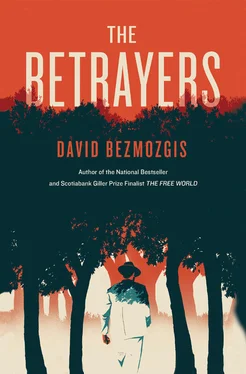David Bezmozgis
The Betrayers
And when Hadad heard in Egypt that David slept with his fathers, and that Joab the captain of the host was dead, Hadad said to Pharaoh: “Let me depart, that I may go to mine own country.” Then Pharaoh said unto him: “But what hast thou lacked with me, that, behold, thou seekest to go to thine own country?” And he answered: “Nothing; howbeit let me depart in any wise.”
— FIRST KINGS 11:21–22
There can be no struggle for national liberation without sacrifices and repression, death in battle and the execution of martyrs. And nothing on earth can withstand the power of self-sacrifice.
— DAVID RAZIEL
A thousand kilometers away, while the next great drama of his life was unfolding and God was banging His gavel to shake the Judaean hills, Baruch Kotler sat in the lobby of a Yalta hotel and watched his young mistress berate the hotel clerk — a pretty blond girl, who endured the assault with a stiff, mulish expression. A particularly Russian sort of expression, Kotler thought. The morose, disdainful expression with which the Russians had greeted their various invaders. An expression that denoted an irrational, mortal refusal to capitulate — the pride and bane of the Russian people. That Leora persisted in arguing with the girl proved that she was the product of another culture. In Israel, notoriously obstinate country, argument could be sport, sometimes engaged in for its own sake, sometimes to accomplish something. But this Levantine penchant for argument was of no use in a Crimean hotel at high season. Much had changed, Kotler observed — the very existence of this modern hotel and a few others like it; the vacationers in their Western fashions and their brash, contemptuous, cheerful, money-induced postures; all the visible appurtenances of progress and prosperity — but at the root, where it mattered, there was no change. One had only to look at the Russian girl’s face. A people’s mentality, this hard nut, mysterious and primitive, resisted change. Yet to espouse such a view was now considered provocative, and it was precisely this sort of provocative thinking that had landed him in his predicament, Kotler thought gravely — but not without a twist of ironic satisfaction.
Leora spun away from the registration desk and strode over to Kotler. He regarded her as she approached, a strong-minded Jewish girl, dark curls flying, black eyes fierce with indignation, her solid, compact figure radiating rebuke. Perhaps someone could think, considering them, that here was a dutiful daughter vacationing with her father. But wasn’t that yet another of the changes, the increased number of daughters and fathers who seemed to be vacationing together?
— The cow says they have no record of our reservation, Leora announced. An outright lie. I was tempted to tell her whom she was dealing with.
— I’m sure it would have made a profound impression.
— I wouldn’t be so dismissive of your importance.
— Well, there’s something I’ve seldom been accused of, Kotler said.
— I don’t find this nearly as amusing as you do.
— All right, Leora, what do you propose we do? Write an open letter, stage a hunger strike?
Each trailing a suitcase, they stepped from the coolness of the marble lobby into the bright glare of the esplanade. In his disguise of white Borsalino hat and dark sunglasses, Kotler blinked out at the tourists who flowed past, the waiters who raced among tables at a café nearby, and the customers who beset the souvenir booths along the stone wall. Beyond which: the sea and the sunbathers on the gray pebble beach. So how much had really changed? Kotler thought. Fifty-three years ago, had the picture been so very different? There’d been no modern hotels, and the offerings at the cafés and souvenir booths hadn’t been quite so eclectic, but there had still been plenty to enchant a ten-year-old boy. Kotler recalled the open-air concerts, the hikes with his father in the surrounding hills, the excursions to the Greek ruins and the Italian fortress, and the long, aimless, scorching days at the beach. They had spent an entire month this way, he and his parents, their only such time together. In the scheme of his family’s story, this one month assumed a legendary, halcyon quality. They never succeeded in repeating it. The following summer, his mother had a terrible appendicitis scare. The summer after that, his father switched jobs. And after that, Kotler’s vaunted musical aspirations interceded. His parents agreed that he shouldn’t spend so much time away from his piano lessons. The great Myron Leventhal consented to take him on, and Kotler traveled for the first time to Moscow. And after that, it was too late. There was always something else he preferred to do. When he wasn’t preoccupied with his studies, he was preoccupied with friends, with girls, and eventually with politics. In retrospect, given the way their lives unfolded, what a shame it was that they never managed to return to Crimea.
Kotler and Leora paused outside the hotel to adjust to their surroundings and circumstances. Leora gazed at the neighboring hotels.
— There’s no point, Kotler said, following her gaze. When I called yesterday, they told me I was getting their last room. It’s August. The town is booked up. Everywhere here we’ll get the same answer.
He read in Leora’s eyes a tempered defiance and disappointment. Tempered, he understood, out of respect and — it couldn’t be denied — concern for him.
— Maybe. But it would take ten minutes to find out.
— I’d sooner not waste the time.
— So what, then? Is that it? Do we just fly back?
— No, we’ve come this far. It would be senseless to leave.
— Wonderful, Baruch. But where will we stay? In a tent on the beach? Like the nudists in Koktebel?
— There’s an idea. I can see the headline and the photo: Baruch Kotler Exposed!
— Yes, and where am I in this photo?
— Beside me. Where else? If this is the way it’s going to be, let them gape.
— I feel I’ve seen enough of those photos.
— Never mind that, Kotler said. Anyhow, we haven’t moved in with the nudists just yet.
Off the esplanade, he flagged down a taxi, and the driver helped them stuff their suitcases into the trunk. He took them back to the town’s bus station, where, not quite three hours earlier, they had arrived on the bus from Simferopol. The atmosphere then had been hectic: vacationers vying for taxis, and a clutch of locals — mainly apartment brokers with brochures and business cards — clamoring for lodgers. At the time, Kotler had paid them little mind. He’d noticed them only insofar as they reminded him that it was with such people that he and his parents had lodged. They had taken a room with a middle-aged Russian couple who lived also with their married son and his family. They had coexisted peaceably, without conflicts, for the entire month, sharing among them not only the kitchen but also the toilet. Simpler times. And now, since it was nostalgia that had, however convolutedly, brought him back to this place, he had no cause to regret what had happened at the hotel. On the contrary, if what he wanted was to revisit the past, to draw as closely to it as he could, then the Russian girl had done him a favor.
The scene at the bus station was no longer what it had been in the morning. Now there were far fewer people about, only a small number of locals grouped together at the end of the plaza, waiting listlessly, some holding their hand-lettered signs across their knees or down at their sides. They roused slightly at the sight of him, Leora, and their suitcases, but none bothered to approach. He and Leora were, after all, unlikely clients, heading, it would seem, in the wrong direction. A thought struck Kotler, and he told Leora to wait with the bags as he went into the bus station to consult the schedule. A stain of pessimism and defeat adhered to the people waiting outside, implicating them in their own bad fortune. Kotler could not repress the suspicion that if they were lingering, if they had failed to attract lodgers, it was for good reason.
Читать дальше












